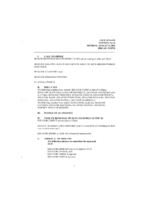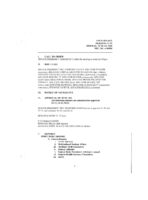Search the Special Collections and Archives Portal
Search Results

Joseph C. Mattingly interview, February 23, 1979: transcript
Date
Archival Collection
Description
On February 23, 1979, collector Sean Powers interviewed Joseph C. Mattingly (born April 21st, 1912 in Texas) at his home in Las Vegas, Nevada. In this interview, Mr. Mattingly discusses working construction on many buildings in the Las Vegas and Henderson areas in Nevada. He also talks about being a member of a motorcycle club and about air conditioning in the early days.
Text

Jean Sherman McColl interview, March 1, 1977: transcript
Date
Description
On March 1, 1977, collector Sam C. Melchiome Jr. interviewed Jean McColl (born May 24th, 1931 in California) at her home in Las Vegas, Nevada. In this interview, Jean McColl discusses growing up in Searchlight and then Las Vegas, Nevada. She discusses how her family came here as well as the many changes she has seen through the decades living in Las Vegas, Nevada.
Text

Al McDaniels interview, February 28, 1980: transcript
Date
Archival Collection
Description
On February 28, 1980, Rodney Goosby interviewed Al McDaniels (b. 1940 in Muskogee, Oklahoma) about his life in Las Vegas and his career as an athletic coach. McDaniels, referred to as Coach by Goosby, speaks primarily about his time as a coach for track and field at the University of Nevada, Las Vegas, his community involvement and the city’s recreational activities. Moreover, McDaniels speaks about his education and his current research as he works on a doctoral degree in physical education. Lastly, he talks about the city’s growth and the move from empty desert spaces to housing and shopping center constructions.
Text

Transcript of interview with Evelyn Miller McDonald by Maylene C. Cabatingan, February 26 & 27, 1980
Date
Archival Collection
Description
On February 26, and 27, 1980, Maylene C. Cabatingan interviewed Evelyn Miller McDonald (born 1905 in Alderson, West Virginia) about her life in Las Vegas, Nevada. Also present during the interview is Maylene’s step-father (name unknown) who occasionally participates in the conversation. At the time of the interview, McDonald had lived in Nevada for over seventy-two years and described early Las Vegas as a small-town railroad community with few amenities. McDonald discusses her occupational history, and how her father started the first car garage in Las Vegas. She goes on to talk about the impact of the Great Depression on Las Vegas and how Hoover Dam’s construction reduced the severity of the financial depression in comparison to other cities. She then recites the hotels that were built and the appeal that Vegas had to tourists and divorcees. McDonald later discusses how prostitution was accepted by the community, and recalls a story about how local businessmen rallied together to ensure that a minister would preach the funeral for a young woman who had died, despite being a prostitute. McDonald concludes her interview with a brief discussion of her goals in life and her pride in her daughters.
Text

Julie McDonald interview, March 14, 1981: transcript
Date
Archival Collection
Description
On March 14, 1981, Michael Richardson interviewed Julie McDonald (b. 1945 in Torrance, California) about her childhood and life in Las Vegas, Nevada. McDonald shares her first impressions of Las Vegas, her schooling and the location of residential areas. Throughout the interview, McDonald also goes into detail concerning her occupations at the Guild Theatre, her secretarial work at Nellis Air Force Base, her singing career and being a “21” dealer. McDonald discusses the changes in the gaming industry, particularly the incorporation of women dealers, the use of the silver dollar and the requirements for dealers. McDonald ends by discussing housing, major happenings within Las Vegas, recreation as a kid and mass media in early Las Vegas.
Text

Rosamond McDougal interview, February 14, 1979: transcript
Date
Archival Collection
Description
On February 14, 1979, Concepcion Fernandez interviewed Rosamond McDougal (born in Texas) about her life as a teacher in Las Vegas. McDougal speaks primarily about her time as a teacher in the Clark County School District, her unique class setup and the district’s changes. Moreover, McDougal speaks about the growing number of students and teachers, the superintendent’s role in bond issues, the courses offered, racial integration in the school district (and the casinos), and the building of the University of Nevada, Las Vegas. McDougal gives personal anecdotes about her family, her husband’s job at the Atomic Test Site and her time as an organ player in churches around the city. Lastly, she talks about recreational activities, Helldorado, the casinos and department stores.
Text

Interview with Roger Ray, October 29, 2005
Date
Archival Collection
Description
Text

Meeting minutes for Consolidated Student Senate, University of Nevada, Las Vegas, August 09, 2004
Date
Archival Collection
Description
Text

Meeting minutes for Consolidated Student Senate University of Nevada, Las Vegas, March 11, 2002
Date
Archival Collection
Description
Text

Meeting minutes for Consolidated Student Senate, University of Nevada, Las Vegas, June 14, 2004
Date
Archival Collection
Description
Text
